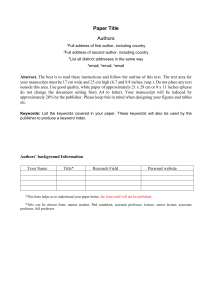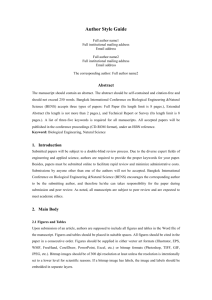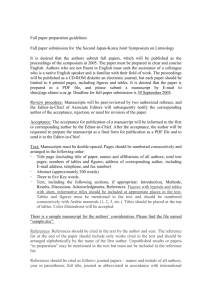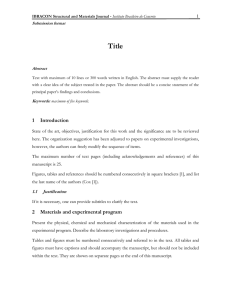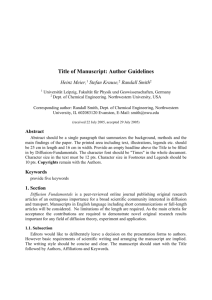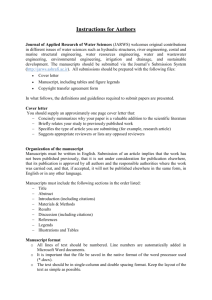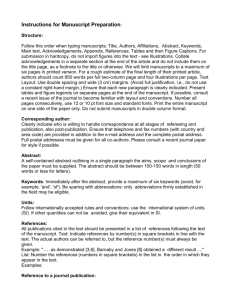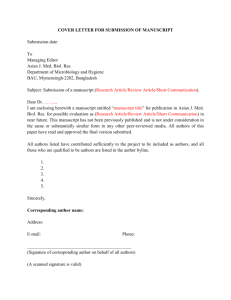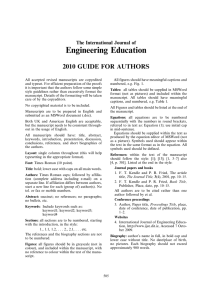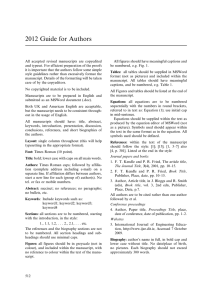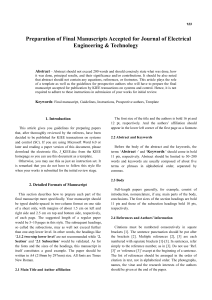Author Style Guide
advertisement
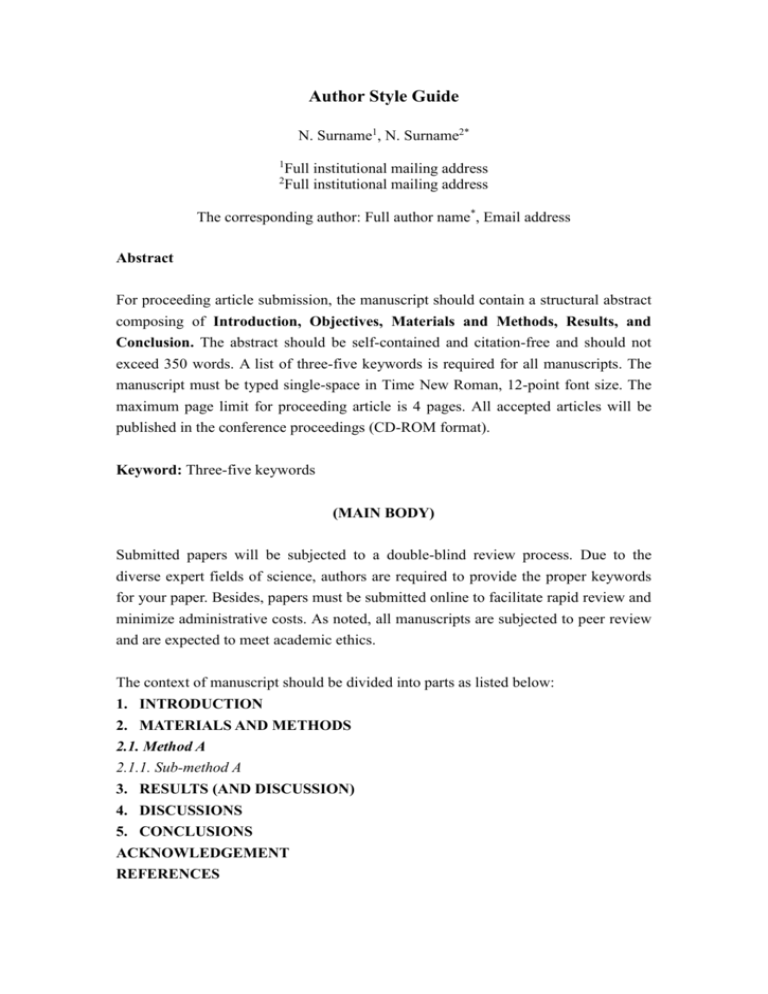
Author Style Guide N. Surname1, N. Surname2* 1 2 Full institutional mailing address Full institutional mailing address The corresponding author: Full author name*, Email address Abstract For proceeding article submission, the manuscript should contain a structural abstract composing of Introduction, Objectives, Materials and Methods, Results, and Conclusion. The abstract should be self-contained and citation-free and should not exceed 350 words. A list of three-five keywords is required for all manuscripts. The manuscript must be typed single-space in Time New Roman, 12-point font size. The maximum page limit for proceeding article is 4 pages. All accepted articles will be published in the conference proceedings (CD-ROM format). Keyword: Three-five keywords (MAIN BODY) Submitted papers will be subjected to a double-blind review process. Due to the diverse expert fields of science, authors are required to provide the proper keywords for your paper. Besides, papers must be submitted online to facilitate rapid review and minimize administrative costs. As noted, all manuscripts are subjected to peer review and are expected to meet academic ethics. The context of manuscript should be divided into parts as listed below: 1. INTRODUCTION 2. MATERIALS AND METHODS 2.1. Method A 2.1.1. Sub-method A 3. RESULTS (AND DISCUSSION) 4. DISCUSSIONS 5. CONCLUSIONS ACKNOWLEDGEMENT REFERENCES Figures and Tables Upon submission of an article, authors are supposed to include all figures and tables in the Word file of the manuscript. Figures and tables should be placed in suitable spaces. All figures should be cited in the paper in a consecutive order. Figures must be supplied as either TIFF or JPG files with a resolution at least 200 dpi. Tables should be cited consecutively in the text. Every table must have a descriptive title and if numerical measurements are given, the units should be included in the column heading. Acknowledgments and Legal Responsibility All acknowledgments (if any) should be included at the very end of the paper before the references and may include supporting grants, presentations, and so forth. References Authors are responsible for ensuring that the information in each reference is complete and accurate. All references must be numbered consecutively and citations of references in text should be identified using superscripted numbers (e.g., as discussed by Gordon2; as discussed elsewhere1, 3). All references should be cited within the text; otherwise, these references will be automatically removed. The references should be listed at the end of the manuscript and numbered in the order they are cited in the main text. For journals the following information should appear: names (including initials of the first names) of all authors when there are 6 or less. When there are more than 6, list only first six and add et al., full title of the paper, and journal name, volume, issue number, pages and year of publication. For books the following should be listed: author(s), full title, edition, publisher, place of publication and year. Examples are as follows. Standard Journal Article (Authors less than 6) 1. Hajkova R, Sklenarova H, Matysova L, Svecová P, Solich P. Development and validation of HPLC method for determination of clotrimazole and its two degradation products in spray formulation. Talanta. 2007;73(2):483-9. Standard Journal Article (Authors more than 6) 2. Bruni R, Medici A, Guerrini A, Scalia S, Poli F, Muzzoli M, et al. Wild Amaranthus caudatus seed oil a nutraceutical resource from Ecuadorian Flora. J Agri Food Chem. 2001;49(11):5455-60. Books (Personal Author) 3. Mills S, Bone K. Principles and Practice of Phytotherapy. Edinburgh:Churchill Livingstone; 2000. p. 23-24, 31-34, 229-231. Books (Chapter in Book) 4. Meltzer PS, Kallioniemi A, Trent JM. Chromosome alterations in human solid tumors. In: Vogelstein B, Kinzler KW, editors. The genetic basis of human cancer. New York: McGraw-Hill; 2002. p. 93-113. Conference proceeding 5. Christensen S, Oppacher F. An analysis of Koza's computational effort statistic for genetic programming. In: Proceedings of the 5th European Conference on Genetic Programming; 2002 Apr 3-5; Kinsdale, Ireland. Berlin: Springer; 2002. p. 182-91. Patents 6. Raaf H, Bimeczok R, Ittel I, inventor; Blendax-Werke R. Schneider GmbH & Co., assignee. Skin care composition. United States patent US 4743442. 1988 May 10.
